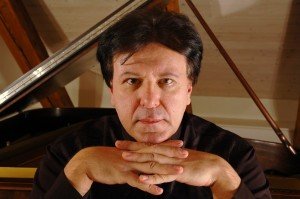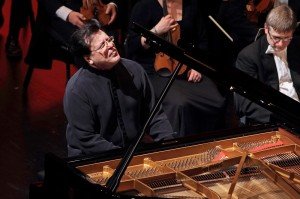
Credit: http://3.bp.blogspot.com/
Frédéric Chopin: Etudes Op. 10

Credit: http://2.bp.blogspot.com/
Following his Carnegie Hall debut in 1985, Gavrilov was celebrated “a major artist” by The New York Times, and when he won the International Accademia Musicale Chigiana Prize in 1989, he was proclaimed “the greatest pianist of the world.”
Sergei Prokofiev: Piano Sonata No. 8, Op. 84 (3rd movement)
Gavrilov was seemingly back in the saddle with an exclusive contract with Deutsche Grammophon. However, out of the blue, Gavrilov stopped giving concerts and stopped all recording projects. One morning in 1993, he decided that he “couldn’t make the journey from Frankfurt to Brussels to play that evening. I suddenly realized I was not going to play this concert,” he says. “It came spontaneously. I called my agent in Belgium and said, ‘I’m not coming.’ He said, ‘Don’t be crazy, we are sold out and the Queen is attending.’ I couldn’t really even explain what was happening to me.” For almost 8 years, Gavrilov wrestled with a deep artistic crisis. “I wasn’t satisfied with myself. I was on top of my career, had everything, and was giving lots of concerts. In a material sense I was doing very well. But I knew if I was to continue in this way I would never be the artist I dreamed of being – free, original, idealistic, out of the so-called musical industry, which is a contradiction in terms. Music cannot be an industry; music is not like producing tractors.” In addition, his marriage was breaking up and he ended up losing his house, his money and apparently his son. “It was a death battle,” says Gavrilov. “I was desperate. I win or I die.”
Maurice Ravel: Concerto for Left Hand
For eight long years Gavrilov was searching to find the meaning behind the notes, and then he suddenly had a revelation. “I had an out-of-body experience on a plane somewhere over Nova Scotia. God opened my eyes and I saw at once the meaning of every note, it was like a lightning strike.” His search for new ideas and new approaches to music culminated in his 2001 comeback tour to Russia. He played 4 piano concertos in one evening, and since then, having lost none of his eccentricity, has been performing regularly. Sporting newly found confidence and greater maturity, Gavrilov now prefers to give life concerts since “recordings are unable to capture all the colors of my musical palette.” And in the last couple of years, he is also conducting all concertos from the piano himself. It remains to be seen how Gavrilov will fare on the ultra-competitive and over-hyped musical stage of today. And his message that teachers and young pianists are “neglecting artistic development, musical analysis, cultural understanding and produce nothing but perfect public toilet sounds” will certainly not make him popular with the younger generation. Be that as it may, Andrei Gavrilov was, and still is, one of the greatest pianists of the 20th century.
Bach: Concerto F moll 2 satz





Brilliant and just in time! Andrei is going to perform Schumann and Prokofiev in Limassol, Cyprus on 23rd of September. Everyone is welcome! https://www.facebook.com/AndreiGavrilovLimassol/
Gavrilov was truly one of the greats – I can attest to that, not merely from his early recordings, but from having been there for his Carnegie Hall debut.
Having said that, I have strong reason to believe that this article white washes a more complex story. Seduced by Western values, Gavrilov soon became addicted to cocaine. His playing became erratic and unpredictable – and worse – boring. Hence, he is left to play venues in Cyprus. Pity.
is Rach3 with Lazarev in 1976 is unsurpassed even by Cliburn, Hough, Kern or Andsnes – the only others I rate near him at that time. He seriously has lost his way, technically and musically. A great loss!